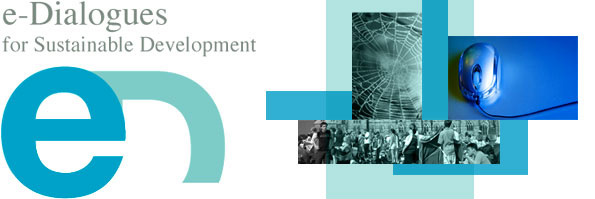 |
Ann Dale, Moderator
Ann Dale is a professor with the School of Environment and Sustainability, Faculty of Social and Applied Sciences at Royal Roads University and holds a Canada Research Chair in Sustainable Community Development (crcresearch.royalroads.ca/). She chairs the Canadian Consortium for Sustainable Development Research (CCSDR), a consortium of all the heads of research institutes across Canada, and is active in the Canadian environmental movement. Dr. Dale chairs an organization she created, the National Environmental Treasure (the NET) and is the Executive Co-ordinator, Research and Public Policy for the Canadian Biodiversity Institute. From 1998-2000, she led an energy efficiency program on behalf of the Association of Canadian Community Colleges. Previously, she was an Executive with the Federal Government, and was one of the two public servants behind the creation of the National Round Table on the Environment and the Economy (NRTEE).
Dr. Dale is a Trudeau Fellow (www.trudeaufoundation.ca), as well as a Fellow of the World Academy of Art and Sciences. She is also a Board member of the World Fisheries Trust, and the Advisory Committee to the Montreal Institute for the Environment. Dr. Dale holds degrees in psychology and public administration from Carleton University, and a doctorate in Natural Resources Sciences, McGill University. Current research areas include governance, social capital and sustainable community development, biodiversity policy, and deliberative electronic dialogues (crcresearch.royalroads.ca/edialogues). She is a recipient of the 2001 Policy Research Initiative Award for Outstanding Contribution to Public Policy for her book, At the edge: sustainable development in the 21st century.
|
 |
Laszlo Pinter, Director - Measurement and Assessment, International Institute for Sustainable Development
László Pintér joined IISD in 1994 and since 2003 serves as the Director of the Measurement and Assessment Program. During his time at the Institute he conceptualized, contributed to and lead projects with emphasis, among others, on state of the environment and sustainability reporting, sustainable development indicators, performance evaluation and integrated assessment in place-based, sectoral or global contexts. He brings a mentality strongly rooted in systems-thinking and a strategic approach, illustrated by his work on national sustainable development strategies. Since 1996 László leads IISD's activities as a Collaborative Center of the United Nations Environment Programme on the Global Environment Outlook program and associated capacity building activities. During 2000-01 he spent ten months as a Global Environmental Assessment Practitioner Fellow at the Kennedy School of Government of Harvard University, where he carried out research on the relationship between global integrated environmental assessment system design and effectiveness. Besides leading a high calibre and growing team of professionals, he often serves as an advisor to various international bodies, but also values opportunities to contribute to and learn from practical sustainablity initiatives face-to-face at the community level.
|
 |
Linda Harvey, Team Lead, Environmental and Safety Management, City of Calgary
Linda has many years of experience in the areas of sustainability, land use planning, environmental management, community partnerships, strategic planning, and indicators and reporting. She has delivered papers on community sustainability issues locally, nationally and internationally. She has worked in collaboration with Federal and Provincial government departments and local governments in Canada, the U.S., Germany and Australia. She holds a Master of Arts degree in Environment and Management from Royal Roads Unive4rsity and has managed sustainability, air quality and climate change issues in British Columbia, Ontario and Alberta. She is currently teaching Environmental Management at the University of Calgary and working for the City of Calgary leading the Ecological Footprint Project.
|
 |
Dr. Meg Holden, Assistant Professor of Urban Studies and Geography, Simon Fraser University, Vancouver
Her research examines and promotes the hope of cities around the world for
sustainable development and has taken her to studies of policy, indicators, and action, civic engagement and social learning, urban philosophy and ethics, and community-based information systems approaches. A major current project involves founding and directing the Regional Vancouver Urban Observatory (www.rvu.ca), within the UN-Habitat Global Urban Observatory network, to develop an inter-perspective indicator set for the future-sustainable Vancouver region |
| |
Gwen Colman, Youth Program Director, GPI Atlantic
Gwen has worked as an editor and project manager on several large environmental impact statement and database projects. She has also worked as a small magazine editor and journalist. Gwen has hosted workshops for young writers, a debate club, and numerous special events for youth for many years and is a youth advocate. The Gross National Happiness (GNH) Youth Program was developed by Gwen (together with other partners) at the Rethinking Development Conference and continues under her direction. Other GPI Youth projects in the works include creating universal separate reporting of child/youth indicators; purchase of an island with the St. Margaret’s Bay Stewardship Association for youth environmental and nature programs; and a youth training program in GPI survey design and delivery.
|
 |
Dr Ron Colman, Executive Director, GPI Atlantic
Dr. Ronald Colman is founder and executive director of GPI Atlantic, a non-profit research group that is constructing an index of wellbeing and sustainable development (the Genuine Progress Index). Dr. Colman previously taught for 20 years at the university level and was a researcher and speech-writer at the United Nations. Over the past decade, he has researched and written numerous reports on indicators of population health, social wellbeing, natural resource health, and environmental quality for the Genuine Progress Index. See www.gpiatlantic.org for Dr. Colman’s publications and details on GPI Atlantic. He advises governments and communities on indicator work that integrates social, economic, and environmental realities, and he regularly presents this work to government, university, and community groups in Canada and abroad. In cooperation with three Nova Scotia communities, Dr. Colman and GPI Atlantic are also developing measures of wellbeing and sustainable development at the community level.
|
|
